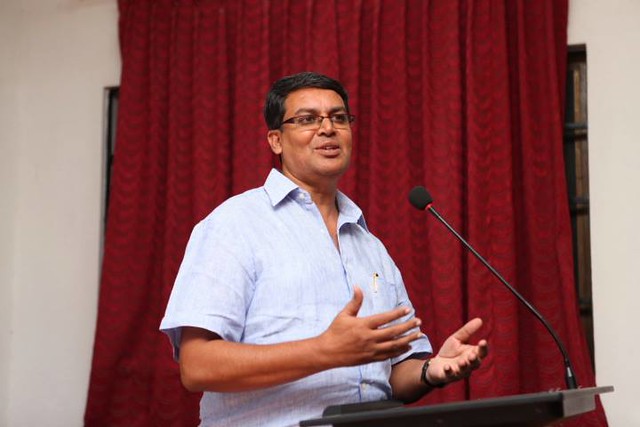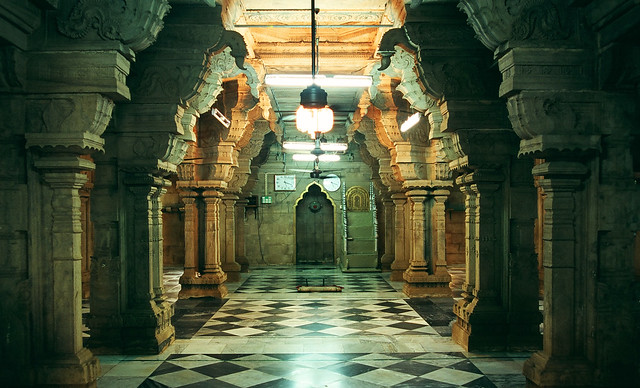By Shaik Zakeer Hussain, TwoCircles.net,
Bangalore: At the end of the screening of ‘Yaadhum’ at Chennai’s Roja Muthiah Research Library last month, Mina Swaminathan, a pioneer educationist walked up to Kombai S. Anwar and said that she wanted to apologize to him. Anwar, who was feeling ecstatic that his labour of love, was released after four years of painstaking research and struggle says, he was “taken aback” that such a distinguished and elderly person, wanted to apologize to him.
When he asked, somewhat embarrassingly the reason for her feeling vindicated, Swaminathan replied that she always spoke to him in Urdu, whenever she met him, despite him telling her that, he did not speak the language and today after watching the film, she had realized that not every Muslim spoke Urdu and that there is something called the Tamil Muslim, who shares the same history and language as she does. Swaminathan, who has witnessed the unfolding of terrible tragedies during the partition, said that she now felt “contended.”

Kombai S. Anwar
“We need to break this stereotyping of Muslim image among people, I want to tell that ours is a highly decentralized, diversified community, with different history and culture,” says Anwar, whose documentary Yaadhum, which means “all” or “everything,” in Tamil, traces the history and cultural identity of Tamil speaking Muslims in the state and beyond.
He says Islam came to South India, way before it made its presence in the North; Anwar points to the fledgling spice trade that existed between the Arabs and the Indians in the south and asserts that Islam in south is as contemporary as Arabia. He quotes Prof. PJ Cherian from his film, and says that trade not only brings goods, but also brings in different ideas, technology and new thinking. He says that contrary to popular belief that the natives were forcefully converted to Islam, the evolution of the community was gradual and has a completely different facet to it and it is these phases and appearances that Yaadhum brings to light.
In the film, Prof M.G.S. Narayanan, Director General, Centre for Heritage Studies, Govt. of Kerala, for example cites one very interesting historical fact, where the Mapilla Muslims, under the leadership of Kunjali Marakkar, who were the Muslim naval chiefs of the Zamorin king of Kerala, were able to successfully stall the invasion of Malabar by the Portuguese for over a century. He says that there was a law which was passed by the Zamorin that at-least one member of the fisherman families in Calicut must get converted to Islam, because the Hindus were reluctant to go to the sea, and the Portuguese were the naval superpower of the time.
Of the many little known and unknown facts, the most striking and revealing one the documentary covers is the fine Dravidian style architecture of mosques found in parts of Tamil Nadu, which Anwar says are in thousands. Dr. Raja Mohamad, Asst. Director of Museums (Retired), Govt. Museum, Chennai, says that there are no regulations with respect to Islamic architecture; “the mosque is a quiet place for prayer.” Hence, he continues, “wherever Islam spread it adapted the local architectural style.” Anwar says that one can see the Dravidian influence in the houses of Tamil Muslims too. He asserts this only proves, how integrated Islam was, in the predominantly Hindu environment.

Kilakarai Jumma Mosque: Kilakkarai jumma palli is one of the finest Dravidian mosques built by Seethakathi Maraikayar at Kilakarai in the late 17th Century.
Yaadhum, which is Anwar’s journey in search of his Tamil Muslim roots and identity takes him and in turn us, from the Vaishnavite pilgrimage town of Alwartirunagari to Kayalpattinam to Pulicat and many other historical places, bringing in great stories and pieces of history of Muslim relations and their progression through the ages.
A former freelance journalist and photographer, S. Anwar found his true calling in documenting history and film making and has in the past made short films on the Big Temple at Thanjavur, commissioned by the Archaeological Survey of India (ASI). In the film, Anwar as a voiceover narrator says that, “While ‘who am I’ is never a question that bothered me during my growing-up years, it became quite important to me and to countless other Muslims, especially in these increasingly troubled times.”
For Anwar those troubled times, came in the form of the 1998 Coimbatore bombings and the communal riots that followed it. Though the event shook him mentally, but it was reading Tariq Ali’s ‘Shadows of the Pomegranate Tree’ that made him ponder over the “Islam and Muslims that he saw around him, and the Islamic society that the book talks about, which is that of tolerance and openness”. A series of seminars and writings on the local history followed, until he later realized that, there is a tremendous amount of distortion of Muslim history and that a film, if not completely erase it, but at least could abate the misconceptions surrounding the community and its history.
Film trailer:
The documentary is the first of the three part series that he has planned, the next two parts will among others, and focus on the Tamil Muslim diaspora, which he says is in great number. Having received great appreciation and recognition for the work in Tamil Nadu, he now plans to screen the documentary in cities and towns across the country and abroad, and is currently in talks with few universities.
Anwar says that Yaadhum has made him reflect, that, like the Muslims of the past, who lived assuming multiple identities, without those identities coming in to conflict, with either their religious believes or their inhabited milieu, he too, has multiple identities. He says his identity is not only that of a Muslim, but also that of a Tamil and many others, and like the old Tamil adage goes, ‘Yaadhum Oore Yaavarum Kelir’ – The world is mine, all are my kinsmen.
The film can be bought at Yaadhum.com.
